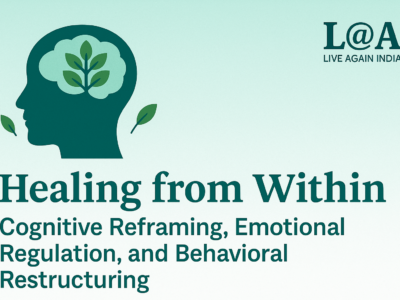How alcoholism can affect your children’s mental health
Dear reader if you are experiencing or seeing someone facing the challenges of alcohol dependence disorder within your family, with this article we are offering support. It provides you valuable insights, tips, and resources to help you stay healthy and deal more effectively with difficult life situation. From understanding the nature of alcohol dependence to implementing effective coping strategies, you will find guidance that can make a positive difference in your family’s journey towards healing and recovery. Remember, you are not alone, we are standing by you, and there is hope for a brighter future. LIVE AGAIN India mental wellness aimed to spread awareness in the society about different aspects of mental health concerns for better mental health of everyone.
Alcoholism, also known as alcohol dependency or alcohol use disorder, can have significant negative effects on the mental health of both the individual struggling with addiction and their family members “especially children’s”.
How alcohol dependence of parents can affects their children’s mental health.
When parents have alcohol problem or dependence, it can have a detrimental impact on their children’s mental health. The instability, neglect, and chaotic environment associated with alcoholism can lead their children’s to emotional distress, anxiety, depression or other mental health conditions. Witnessing parental alcohol abuse can increase the risk of developing substance abuse issues later in life.
- Experience of Emotional Instability -: Children living with alcohol-dependent parents often experience emotional instability. The inconsistent behaviors and mood swings associated with alcoholism can create a chaotic environment, leading to anxiety, fear, and uncertainty for the child. They may constantly worry about the well-being of their parents, causing emotional distress and difficulties in regulating their own emotions. This emotional instability can affect their overall mental well-being, interpersonal relationships, and even their academic performance.
- Feeling of Neglect and Fear of Abandonment -: When parents struggle with alcoholism, the well-being of their children may suffer greatly. The parents’ preoccupation with alcohol can lead to neglect of their children’s emotional and physical needs. As a result, children may experience feelings of being neglected and rejected, which can greatly impact their self-image and self-worth. This neglect can have detrimental effects on the child’s overall development, potentially leading to mental health issues and difficulties in forming healthy relationships. The absence of proper parental guidance and support can leave children struggling to regulate their emotions and live life effectively.
- Physical and Verbal Abuse -: Being victims of abuse, children experience trauma and develop feelings of fear and insecurity. They may also develop a distorted understanding of what constitutes a healthy relationship, leading to difficulties in forming and maintaining positive connections later in life. The constant barrage of abuse can lead to chronic stress, anxiety, and depression in children and affect their overall well-being and hindering their cognitive and emotional development. These negative experiences can also lead to a higher risk of developing mental health disorders, such as post-traumatic stress disorder (PTSD), and can lead to self-esteem issues and difficulties in managing emotions effectively.
- Its Interference with Cognitive Development of the child -: One of the most significant ways that alcoholism can affect a child’s health is through its interference with their cognitive development. Children who are exposed to alcoholism may struggle with intellectual and cognitive issues such as difficulties in concentration, attention span, memory, learning and retaining information. This may lead to problems at school and impact their academic performance. Children of alcohol dependent individuals may develop social and emotional development issues which can lead to anxiety, depression, and other mental health problems later in life. And also can also put children at risk for alcohol and substance abuse and addiction in the future.
- Increased Risk of Substance Abuse -: The increased risk of substance abuse in children of alcohol-dependent parents is significantly positive. It can perpetuate the exposure and cycle of addiction, lead to persistent struggles with mental health throughout their lives.
- Mental Health Disorders -: Exposure to alcoholism during childhood increases the risk of developing various mental health disorders, such as anxiety, depression, post-traumatic stress disorder (PTSD), conduct disorder, borderline personality or antisocial personality disorder. These conditions can have long-lasting effects on their overall well-being and future.
- Social Isolation -: Social isolation is a common consequence for children with parents struggling with alcoholism. The stigma surrounding alcoholism can lead to embarrassment and exclusion from social groups, making it difficult to form and maintain healthy relationships. This isolation can contribute to feelings of loneliness, low self-esteem, sense of not belonging and a lack of support. Moreover, the absence of a supportive social network can exacerbate the emotional and psychological impact of growing up with an alcoholic parent. Social isolation further can lead the children to face negative impact on their overall well-being and development.
- Impaired Emotional Regulation -: Children growing up in family environment affected by alcoholism may experience frequent emotional disruption, inconsistency, and unpredictability, leading to difficulties in managing their own emotions effectively. As a result, they may struggle with emotional conflicts, passive aggressive behavior, depression, anxiety, and other mental health issues, which can manifest as irritability, impulsivity, and difficulties with self-control. The inability to regulate emotions can also increase the risk of risky behaviors such as substance abuse or self-harm.
Psychological Intervention
Psychological intervention, detoxification treatment and rehabilitation treatment can play a crucial role in addressing alcoholism and support the individuals and families to enhance life.
- Therapy and Counseling -: Therapy and counseling can provide a supportive and safe environment for individuals and families affected by alcoholism to address emotional trauma or other mental health conditions. Counseling helps them to develop effective coping strategies to manage their emotions and challenges related to family environment. Therapy also focuses on improving communication skills, allowing family members to express their feelings and concerns openly and aims to rebuild trust within the family unit, fostering a healthier and more nurturing environment.
- Support Groups -: Support groups like Alcoholics Anonymous (AA) or Narcotics Anonymous (NA) and family-al-anon meetings for family members offer a community of individuals who have faced similar struggles with alcohol or drug addiction. These groups provide a safe and non-judgmental space for people to share their experiences, challenges, and successes. The support and empathy received from others who have gone through similar situations can be incredibly empowering and uplifting. It also helps individuals and families realize that they are not alone in their journey. Support groups facilitate the exchange of practical advice, coping strategies, and resources for recovery. The connections made in support groups can lead to long-lasting friendships and a sense of belonging. Participation in support groups can provide a crucial source of encouragement, validation, and understanding for individuals and families affected by addiction.
Alcoholism has a profound impact on children’s mental health, often resulting in emotional instability, neglect, abuse, impaired development, and increased risk of mental health disorders. With psychological intervention and rehabilitation treatment, individuals and families affected by alcoholism can find hope, healing, and recovery. It is essential to address the root causes, provide support, and promote resilience to create healthier, happier futures for both parents and children.
For more personalized need based guidance and treatment, talk to your mental health professionals. Consult to a psychologist or psychiatrist.
Your life is precious, take care of yourself and family. You are not alone. We are standing by you.
Life is beautiful.
Live it fully. Say yes to life. Welcome to life.



